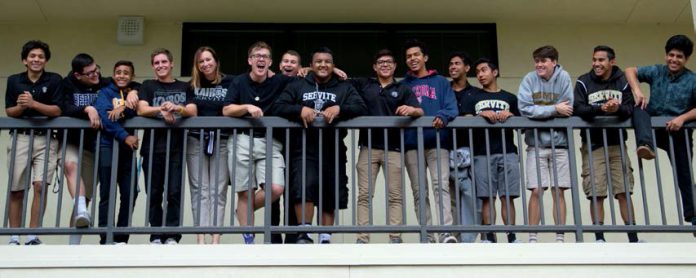By Stephen Walswick ’02, Assistant Principal of Curriculum
As the primary educator of your son, your knowledge and understanding of who he is as a person is essential to your ability to guide his development, formation, and overall success. Servite High School is thankful to be able to partner with parents each year in providing an environment that is specifically designed toward the unique and important needs and learning styles of teenage boys. By being acutely aware of male development, Servite faculty and staff are able to implement a variety of learning and formation strategies that both engage the students and catalyze their growth. In her book, Teaching the Male Brain: How Boys Think, Feel, and Learn in School, Dr. Abigail James states that “[single-gendered schools] have been shown to be of benefit for many students and it is imprudent to sweep them away simply based on social political dogma.” As you explore Servite High School, we hope that you gain a deeper understanding and appreciation for the impact an all-male education can have on your son.
The biggest contributing factor to the all-male difference is the Servite teacher. Servite faculty members dedicate their lives and careers to educating and forming young men. Their passion can be witnessed in and out of the classroom as they seek to do more than instruct; they endeavor to develop meaningful relationships with their students. Research suggests that boys are more willing to work hard and learn new things if they feel they have a role model or mentor guiding them. Servite teachers’ success stems from this knowledge and experience of working with an all-male student population.
A great deal of the faculty is comprised of alumni or those who have worked at Servite for ten years or more. All teachers have gone through and continue to go through training on the best practices, engagement strategies, and learning differences when working with boys. One critical area that teachers intentionally foster is a positive classroom environment, because, as Dr. James also notes, “one of the major advantages of single-gender education for boys is the freedom to learn an emotional vocabulary and use it in a safe environment.” As Michael Reichert and Richard Hawley present in their book, I can Learn From You: Boys As Relational Learners, “Emotional connections in the classroom are essential for boys, and to deny those emotions means that boys lose motivation to learn.” My own experience has validated these findings, as I witness so many students come back year after year desiring to share their latest accomplishment or discuss a current challenge.
Just this past year, I ran into a member of the class of 2012 while he was visiting on campus. He told me that he had graduated college this past spring. When I asked what his degree was, he replied, “It was English. I studied English because of your class.” I had no idea at the time I was teaching him or throughout his four years of college what an impression I had made on him. Similarly, it was my own senior English teacher, Mr. McQuiston, who inspired me to pursue studies in English, and it was nearly a dozen other teachers (some of whom are still teaching at Servite) who I attempted to emulate when I first started teaching at Servite over ten years ago.
What sets Servite teachers apart, both then and now, is the degree to which they understand boys. They are able to identify when a student is trying to be funny and when he is making inappropriate comments and employ their creativity and humor to engage students in the subject matter. History teachers bring in replicas of historical weapons, have students build models of military vehicles, and hold class-wide debates on critical moments in history. Math teachers have taught linear and exponential graphing by having students build a raised garden bed and measure and chart plant growth. Fine Art teachers take students all over the United States to compete, perform, and showcase their talents. Theology teachers have used the game Risk to teach ethics and just war theory. Science teachers engage their students with hands-on laboratory experiments involving a myriad of specimens and chemicals. Servite’s language teachers walk to nearby panaderías or Chinese markets and order food in their target languages. While these types of experiences may not occur every single day, the unique environment allows for them frequently and easily.
At Servite, we are afforded the opportunity to research and implement the best practices for instructing an all-male student population. In the way we are able to approach details such as alternative seating, recreational opportunities, and even the design and layout of the library, the Servite faculty and staff continue to intentionally craft a unique student experience that is tailor made for young men. In a time and culture in which research about the underachievement of young men abounds, we are grateful to be able to provide our students with an environment for which they are naturally suited and a team of teachers and mentors who understand what they need to succeed.
Stephen Walswick ‘02 is the Assistant Principal of Curriculum. He graduated from Loyola Marymount University with a B.A. in Philosophy and English and a Certificate in Catholic School Administration and Chapman University with a M.A. in Teaching.













